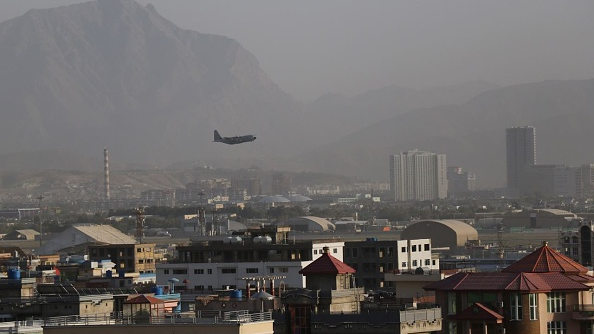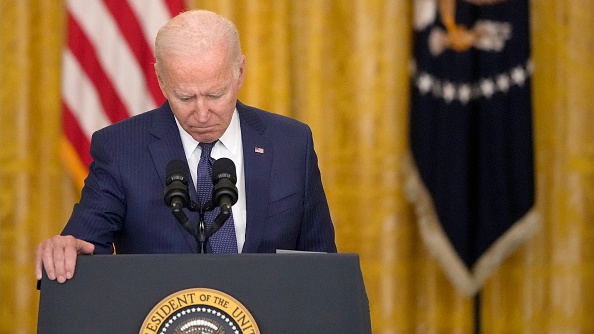
A U.S. plane is seen taking off a day after explosions hit crowds outside the Kabul airport in Kabul, Afghanistan, August 27, 2021. /Getty
**Editor's note: **John Gong is a professor at the University of International Business and Economics and a research fellow at the Academy of China Open Economy Studies at UIBE. The article reflects the author's views and not necessarily those of CGTN.
The United States is a national security state, period. The entire national security apparatus, including the military, the intelligence community (including a whopping group of 16 agencies under the Director of National Intelligence), the defense industrial complex, the Defense Advanced Research Projects Agency (DARPA) program, other peripheral research organizations dedicated to defense embedded in the academic communities, the Washington think tank industry related to defense and international relations, the lobbyists and the Congressional staff focused on national security, etc. and etc.
All of these things combined would constitute north of 10 percent of America's GDP, or about $2 trillion, based on my conservative back-of-the-envelope calculation. The announced open-book federal defense budget itself is already 3.5 percent of GDP, accounting for one-sixth of all federal expenditures.
This roughly $2 trillion monster creates a national security basic instinct for consistently seeking war, like a pride of lions' basic instinct to constantly seek to kill. Jimmy Carter once famously pointed out that the United States has enjoyed only 16 years of peace in its 242-year history, and he said it is "the most warlike nation in the history of the world."
In the 70 some years after World War II, only 1954, 1976-1981, 1985-1988 saw no military actions from Washington. Aside from the four large wars in Korea, Vietnam, Iraq and Afghanistan, the United States has invaded: Lebanon, Dominican Republic, Grenada, Panama, Somalia, Bosnia, Haiti, Kosovo, Libya, Uganda, and Syria. Lebanon, Iraq, and Somalia actually got screwed twice.
And I haven't even included the countless assassinations, coup d'état and regime changes that the CIA has orchestrated all over the world.

U.S. President Joe Biden speaks about the situation in Kabul, Afghanistan, from the East Room of the White House, August 26, 2021. /Getty
In the wake of the winding-down of the disastrous Afghanistan war, CGTN's think tank conducted a survey among its five-language viewer base about this war issue with respect to Washington. One of the questions asked in the survey regards the reasons leading to the U.S. becoming so "warlike." Not surprisingly, a high percentage of respondents – 80 percent of them – show a negative attitude toward U.S. belligerence.
Various reasons have been raised. For example, one netizen cast it in a religious and political context, "I think the U.S. uses the term superpower not for the well-being of the world, especially poor countries, but for plundering money in Muslim countries … then (they) leave to attack other countries, in order to make their own country safe."
All of these reasons that I have seen make a lot of sense, to various degrees. But none points to one issue that I think is important – the endogenous nature of war. In building baseball stadiums in the U.S., there is a saying that "if you build it, they will come," referring to sports fans who will show up at baseball games. In defense, I say, if you build it, they will use it.
Used by whom? Of course used by the national security and foreign policy establishment. This is a tightly-knit community, essentially a state within a state, in collusion with the military industrial complex, which has enormous lobbying power in Washington, to constantly salivate over the next war. It is impenetrable, bullet-proof, accountable to no tax payer, immune to any political accountability, and totally independent of its own. It has become a self-propelling killing machine with missiles, bombers, war ships, jet fighters, and human lives too, forever feeding into it.
A few dozen people caballing behind closed doors somewhere in Washington, D.C., you then see "destruction, turmoil, division, death, despair, pain and hatred" broiling in some corner of the world. And by the way, these are the most frequent key words mentioned by CGTN think tank's survey respondents, when it comes to asking what America's many wars have brought to the world.
The defense industry's self-propelling war-making mechanism may be best summarized by what is called the "Ledeen principle," which states: Every 10 years or so, the United States needs to pick up some small crappy little country and throw it against the wall, just to show the world we mean business. Michael Ledeen was once a Pentagon policy advisor and special consultant to the U.S. National Security Council. If one looks at America's history of war in the last 70 years, Ledeen's statement happens to be a gross underestimate.
(If you want to contribute and have specific expertise, please contact us at [email protected].)
 简体中文
简体中文

